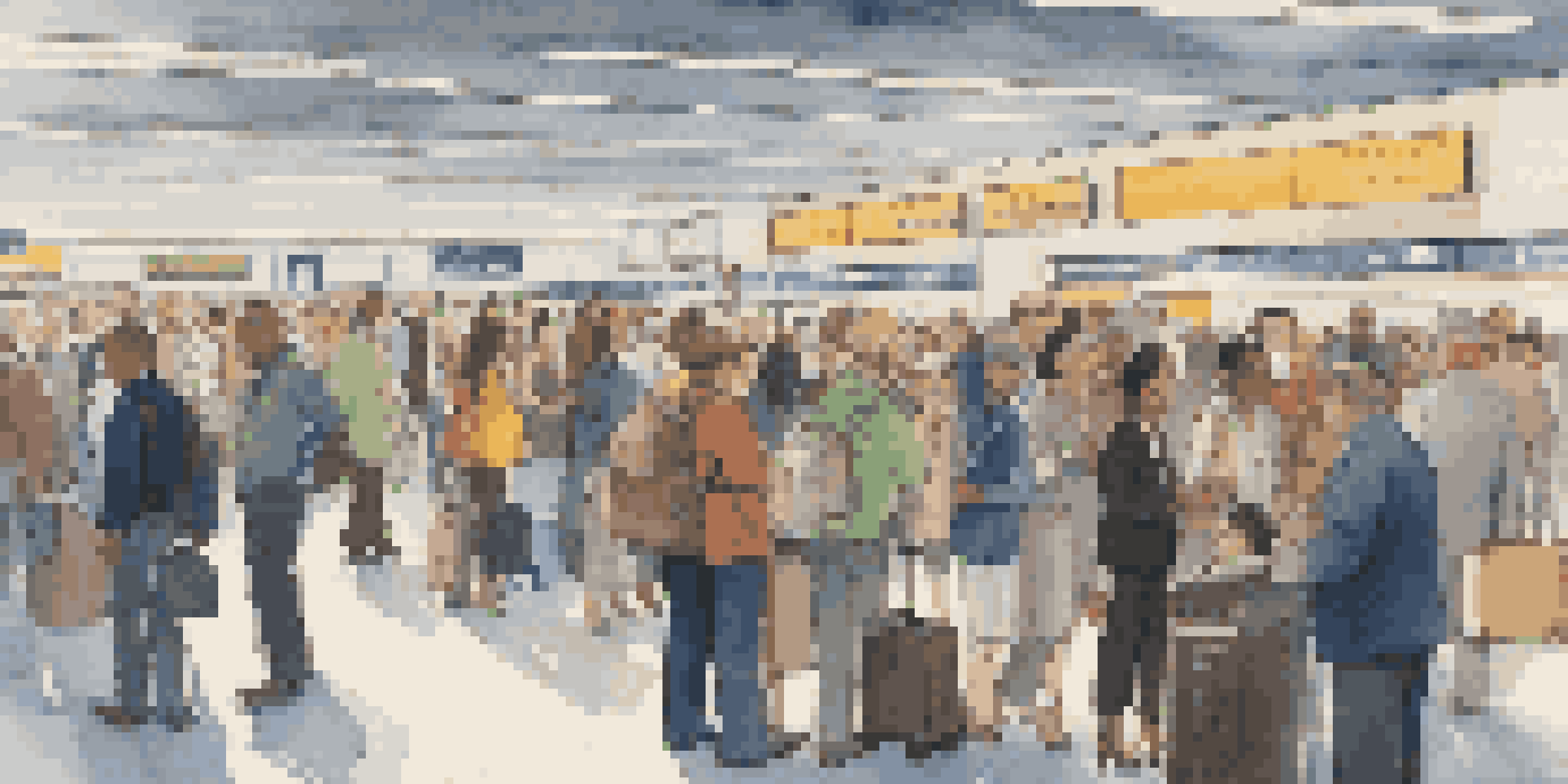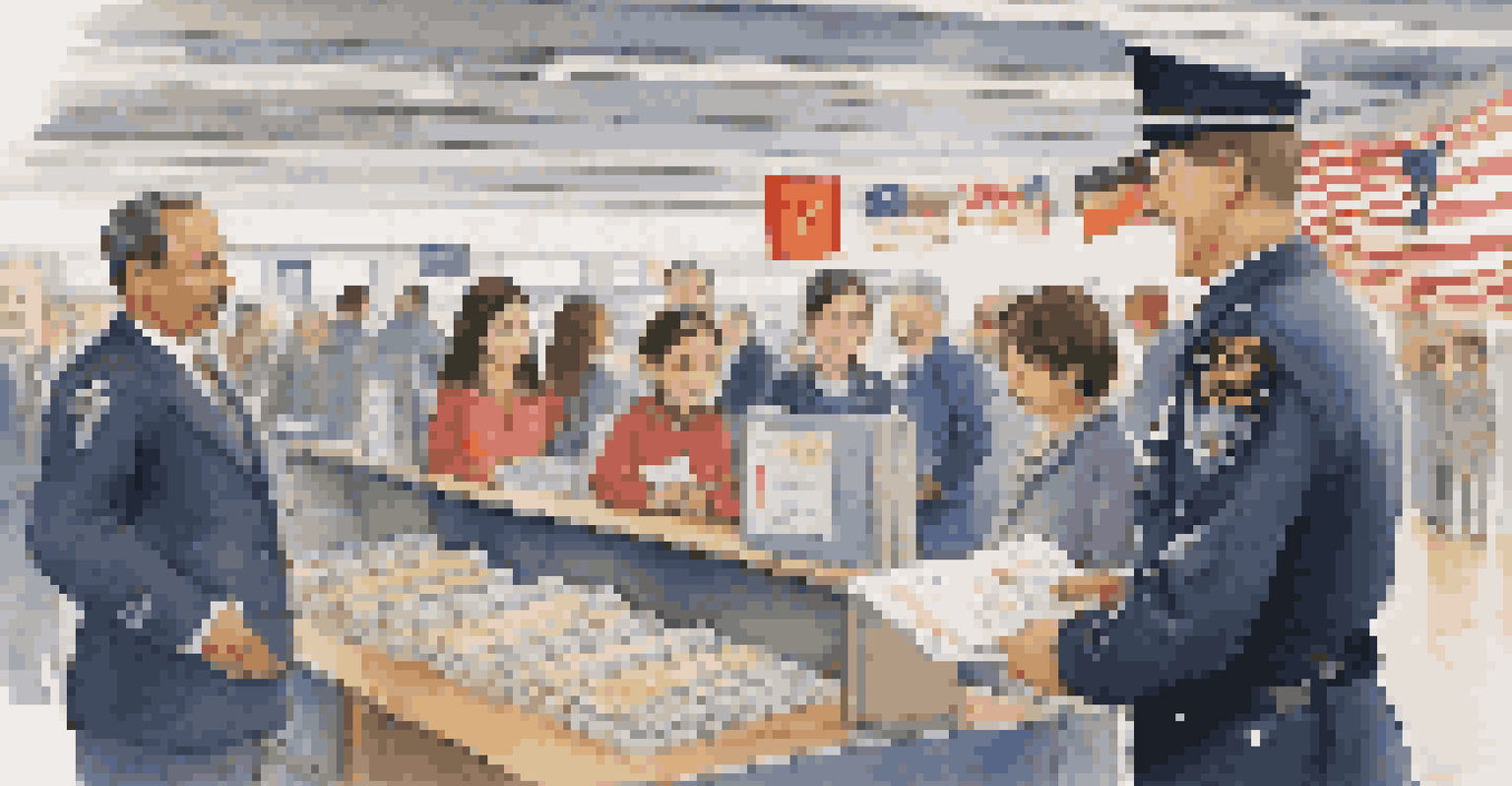Traveling Internationally: Navigating Customs and Immigration

Understanding Customs and Immigration Basics
Customs and immigration are essential parts of international travel that help countries regulate the entry of people and goods. Customs focuses on the importation of items, while immigration deals with the movement of people across borders. Knowing the difference can simplify your travel experience.
Travel is fatal to prejudice, bigotry, and narrow-mindedness.
When you arrive at a new country, you'll encounter customs officers who check your luggage for restricted items, such as certain foods or plants. Immigration officials, on the other hand, verify your identity and travel documents to ensure you can legally enter the country. This distinction is crucial for a hassle-free journey.
Understanding these processes not only prepares you for what to expect but also helps you avoid potential fines or delays. So, before you travel, take some time to familiarize yourself with the customs and immigration policies of your destination.
Preparing Your Documents for Travel
One of the most important steps in international travel is ensuring that you have all the necessary documents ready. This typically includes your passport, visa (if required), and any additional paperwork that may be needed for your destination. Double-checking these documents can save you from last-minute stress.

It's also wise to have both physical and digital copies of your important documents. In case of loss or theft, having backups can make your situation much easier to handle. Store them in a secure location, separate from the originals, for added safety.
Customs vs. Immigration Explained
Understanding the difference between customs and immigration helps simplify your travel experience.
Being organized with your documentation not only streamlines your check-in and customs processes but also gives you peace of mind. Remember, the smoother your preparation, the more enjoyable your travel experience will be!
What to Expect at Customs
When you arrive at customs, be prepared for a few standard procedures. You will likely need to present your passport and customs declaration form, if applicable. This form usually asks about the items you're bringing into the country, so be honest and thorough.
The world is a book, and those who do not travel read only one page.
Customs officials might ask you questions about your trip, such as your purpose for visiting and how long you plan to stay. It's essential to answer these questions truthfully. Remember, they are just doing their job to ensure safety and compliance with local laws.
If you're carrying any goods that might be restricted or subject to duty, be ready to provide receipts or further information. Knowing what to expect can ease any anxiety and help you navigate customs efficiently.
Navigating Immigration Procedures
Once you've cleared customs, you'll head to immigration, where officials will check your identity and travel status. This typically involves presenting your passport and any necessary visas. Make sure your documents are easy to access, as this will help expedite the process.
Immigration officers may ask you questions about your travel plans, so having a clear itinerary can help. For instance, knowing your accommodation details and return flight information can demonstrate your intent to leave the country before your visa expires.
Prepare Travel Documents Thoroughly
Having all necessary travel documents ready can save you from last-minute stress and ensure a smoother journey.
After passing through immigration, you can officially start your adventure. Being prepared and organized for this step ensures that you transition from travel mode to exploration mode smoothly.
Know the Customs Regulations of Your Destination
Every country has its own customs regulations, and knowing these can significantly ease your travel experience. For example, some countries prohibit the importation of certain foods, plants, or animal products. Investigating these rules beforehand can prevent any unpleasant surprises at customs.
Additionally, many countries have limits on the amount of alcohol, tobacco, or currency you can bring in without declaring it. Being informed about these limits helps you avoid fines or confiscation of your items, allowing you to enjoy your trip without worry.
You can usually find customs regulations on government websites or travel forums. Doing your homework before you travel can save you time and hassle when you arrive.
Tips for Smooth Customs and Immigration Experiences
To ensure a smooth experience at customs and immigration, arrive at the airport early. This gives you ample time to navigate lines, and you won’t feel rushed to catch your flight. Planning ahead can help you avoid unnecessary stress.
Pack smartly by keeping restricted items out of your luggage and organizing your bags for easy access. If you're traveling with gifts or new purchases, be ready to explain them to customs officials, as they may want to know their value.
Know Your Rights as a Traveler
Familiarizing yourself with your rights during customs and immigration processes empowers you and enhances your travel experience.
Lastly, maintain a calm demeanor. A friendly attitude can go a long way in making interactions with customs and immigration officers more pleasant. Remember, everyone is working towards the same goal: ensuring safe and secure travel.
Dealing with Customs and Immigration Challenges
Even with the best preparation, you might encounter challenges at customs or immigration. Whether it’s a misunderstanding about your paperwork or unexpected questions, staying calm is key. Take a deep breath and remember that remaining composed will help you navigate any situation.
If you're faced with a problem, politely ask the officer for clarification. Often, they are more than willing to help if you approach them respectfully. Communication is essential, and sometimes, a simple explanation can resolve misunderstandings.

In case of serious issues, don't hesitate to ask for a supervisor. They can provide additional assistance or clarification on regulations. Knowing how to address challenges can help ensure that your travel experience remains enjoyable.
Post-Arrival: Understanding Your Rights
Once you've successfully navigated customs and immigration, it's essential to know your rights as a traveler. Most countries have laws that protect your rights during the customs process. For instance, you have the right to request an explanation if your luggage is searched.
You also have the right to be treated fairly and respectfully by customs and immigration officials. If you feel that your rights are being violated, it’s important to remain calm and document the situation. Knowing your rights can empower you during your travels.
Lastly, familiarize yourself with the local laws and customs of your destination. Understanding the local culture can enhance your experience and help you avoid misunderstandings. Being informed is your best ally in international travel.